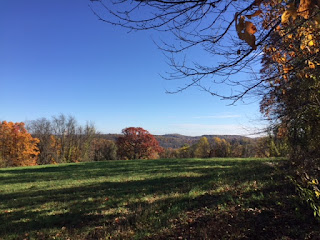Ghost chasers love the old Hankey Church Cemetery, which has sat atop its windy hill near Murrysville, Pennsylvania, since 1796. The old Hankey Church used to stand across the road from the cemetery, in the small grassy yard. It burned down in the 1970s under suspicious circumstances. Notice that Michael Best, who is buried under the dark stone on the right, fought in the Revolutionary War.
Hankey Church Road is a country lane that wends through pretty hills. The cemetery adjoins a golf course, and there are houses in the area. There's really nothing at all spooky about the place, but people travel here from great distances to encounter paranormal phenomena--like orbs of light, cold spots, numbness, floating sensations, and visions of this specter or that. To see just a sample of all the paranormalists' raving about this churchyard, follow this link.
What does it say about our society that peaceful places give so many people the willies? Oh, our noisy, clamorous, technologically-polluted lives. We fear the very things that can make us well, like silence and stillness. I thought it was a lovely place, scenic and serene. It's an old cemetery with lots of weathered old stones and a nice view out over the surrounding countryside. I read about this place just before Halloween, when Facebook was suggesting ghostly adventures on my page. I think it came up on "Only In Your State" or "Atlas Obscura" or some such site. I decided to stop off here on my way home from Saltsburg.
Google it. On the other side of yon picket fence is where the church sat. That area is said to be even more haunted than the cemetery itself. There's been a lot of drivel written about the old church site and graveyard, some of it downright histrionic. One blogger locates the churchless churchyard "in the heart of the Appalachian Mountains," which just shows that she's never actually been here, nor even researched it on a map. The legend about the haunting is pretty hard to buy, too. Supposedly, at some indeterminate time in history, the minister was lynched by his congregation for committing adultery. The adultery part isn't too terribly incredible, I suppose, but the lynching is. Sounds to me like a legend fabricated by a high school student who was reading The Scarlet Letter in English class.
This land still belongs to the Lutheran congregation that used to have a building across the road. Their new church is several miles away, but they still maintain both the old church site and the graveyard. On their website, the congregation has a pretty long essay about their history. In fact, it lists and talks about each clergyman who served the church, all the way back to 1796. And there's no mention of any being hanged in an act of vigilante vengeance. To be fair, the building on this site was once shared between two German-speaking denominations: Lutheran and Reformed (which are essentially continental Presbyterians). The philandering cleric may have been the pastor of the Reformed congregation, in which case he wouldn't be mentioned on the Lutheran website. I don't know if the old Reformed congregation still exists in some new location, or if they have a website, or if they hanged their minister long ago. But I'm pretty sure of one thing: This place isn't haunted. I sat at the church site and ate a tuna sandwich from Subway. No ghosts.





Hmmm, not Appalachian, yet Pittsburgh is called "Appalachia’s largest city" and "The Paris of Appalachia".
ReplyDelete*The Paris of Appalachia: Pittsburgh in the Twenty-First Century
Yes, I think *she* researched it. As for me...I live a 5 minute walk from ti for 30 years of my life.
Oh the things I could tell you ;)
The old reform congregation is located where Olive Cemetery is. The house (new) that sits next to it,was one the log hewn Church. They all now attend Christ's Lutheran.
https://www.amazon.com/Paris-Appalachia-Pittsburgh-Twenty-First-Century/dp/088748509X
Thanks for your comment. Some people also classify Pittsburgh as a Midwestern city. It's the only major city that stands at the convergence of 3 census-designated cultural zones: the Northeast, the South, and the Midwest. So if your preference is to call us Appalachian because you identify with that culture, you'll find condescending writers in New York to agree with you. ;)
DeleteAlso, I wonder why you assume I'm a "she." Is it because men in Appalachia don't write in complete sentences?
We'd love to hear some of your stories about the Hankey Cemetery, and thanks for the clarification about the Reformed Church.
I lived their there, born and raised play in that cemetary, nothing haunted about it.
ReplyDelete